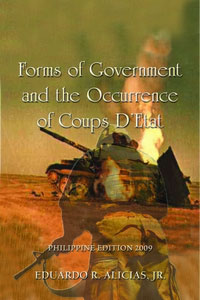- Forms of Government and the Occurrence of Coups D’Etat
- Eduardo Alicias Jr.
- Publisher: Trafford Publishing
- ISBN: 978-1-4251-3700-7
- No. of Pages: 132
- Size: 6"X9"
- Edition: 2009 Edition
Description:
This book provides a comprehensive empirical picture of the relationships between the various forms of government and democratic survivability as indicated by the occurrence of coups.
Chapter 1 deals with basic definitions, typologies, and related studies. Ten basic forms (e.g., presidential, parliamentary republic, etc.) are identified into which 192 countries are classified accordingly. The review of related studies centered on the seminal Linz hypothesis about the greater democratic survivability of the parliamentary systems, as well as on the subsequent studies that either supported or attempted to falsify the same. Notable are the corroborative studies of Stepan and Skach and the adverse critiques hurled by some other scholars. The author attempted to throw more light upon the arena of discourse by examining both the pros and cons of the debate, in light of theoretical and empirical considerations. The Stepan and Skach conclusion(s)—and ipso facto the Linz hypothesis--apparently survived the onslaught.
Chapter 2 provides further warrant of the hypothesis, that is, that parliamentary systems apparently experience a significantly lower incidence of coups, signifying greater democratic stability. This is the clear showing of both bivariate and multivariate statistical analyses, abundantly used in this book.
Chapter 3 explores the empirical nexus between the subordinate forms (i.e., centralized, unicameral, etc.) and the occurrence of coups. Findings show that the centralized (unitary) states are not significantly different from the decentralized or noncentralized (federal) states in respect to the incidence of coups. Likewise, the unicameral countries appear to be more democratically survivable than the bicameral.
Professors and students of political science and government, as well as constitutional engineers, are expected to find this book informative and useful in their respective disciplines, intellectual endeavors, and advocacies.





